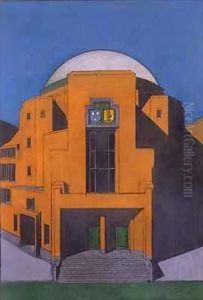H.P. Berlage Paintings
Hendrik Petrus Berlage, commonly known as H.P. Berlage, was a prominent Dutch architect and urban planner born on February 21, 1856, in Amsterdam, Netherlands. He is often considered the 'Father of Modern Dutch Architecture' for his role in the transition from the eclectic styles of the 19th century to the rationalist and functionalist architecture of the 20th century. Berlage studied architecture at the Zurich Institute of Technology in Switzerland, where he was influenced by the rationalist ideas of Gottfried Semper, a German architect and theorist.
After completing his studies, Berlage traveled extensively in order to deepen his understanding of architecture. His travels and studies of historical architecture greatly influenced his later work. He returned to Amsterdam and started his professional career, contributing significantly to the development of architecture in the Netherlands.
Berlage's designs were characterized by the use of brick, clean lines, and the integration of form and function. His architectural philosophy was grounded in the belief that a building should be constructed logically, with a clear structure and purpose. He rejected excessive ornamentation and advocated for a simplicity and honesty in design that would later influence the modernist movements.
One of Berlage's most significant works is the Amsterdam Stock Exchange (Beurs van Berlage), completed in 1903. This building exemplified his approach to architecture with its use of materials, functional design, and the integration of art and architecture. The Stock Exchange became a landmark of Dutch architecture and served as an inspiration for future generations of architects.
Throughout his career, Berlage also engaged in urban planning. He created plans for the expansion of cities such as The Hague and was involved in the design of new residential areas that embodied his architectural principles. His work in urban planning further cemented his legacy as a pioneer of modern Dutch architecture.
Berlage's influence extended beyond his own architectural practice. He was a lecturer and writer, sharing his ideas about architecture and design with a wider audience. His theories contributed to the development of architectural education in the Netherlands and beyond.
H.P. Berlage passed away on August 12, 1934, in The Hague, Netherlands. His work and his approach to architecture had a lasting impact on the field, and he is remembered as a key figure in the development of modern architecture in the Netherlands. His legacy continues to be celebrated, and his buildings are still admired for their innovative and timeless qualities.
